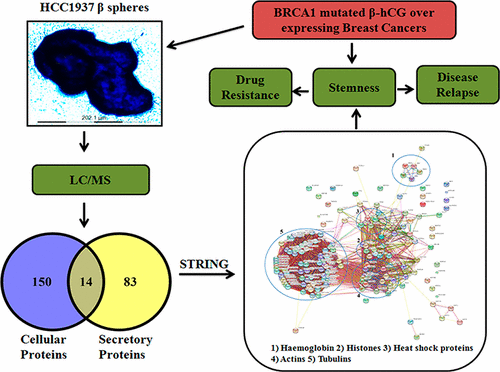当前位置:
X-MOL 学术
›
J. Proteome Res.
›
论文详情
Our official English website, www.x-mol.net, welcomes your
feedback! (Note: you will need to create a separate account there.)
Proteomic Profiling of β-hCG-Induced Spheres in BRCA1 Defective Triple Negative Breast Cancer Cells
Journal of Proteome Research ( IF 3.8 ) Pub Date : 2017-11-07 00:00:00 , DOI: 10.1021/acs.jproteome.7b00562 Satheesh Kumar Sengodan 1 , Arathi Rajan 1 , Sreelatha Krishnakumar Hemalatha 1 , Revathy Nadhan 1 , Abdul Jaleel 1 , Priya Srinivas 1
Journal of Proteome Research ( IF 3.8 ) Pub Date : 2017-11-07 00:00:00 , DOI: 10.1021/acs.jproteome.7b00562 Satheesh Kumar Sengodan 1 , Arathi Rajan 1 , Sreelatha Krishnakumar Hemalatha 1 , Revathy Nadhan 1 , Abdul Jaleel 1 , Priya Srinivas 1
Affiliation

|
Previously, we identified that β-hCG is expressed by BRCA1 mutated but not wild type breast cancers in vitro/in vivo and exhibited a novel event in β-hCG overexpressing BRCA1 mutated HCC1937 cells where the cells were able to form spheres (HCC1937 β spheres) in adherent cell culture plates even in the absence of any growth factors. These spheres express stem cell and EMT markers. In the present study, we carried out the total proteomic profiling of these HCC1937 β spheres obtained from BRCA1 defective β-hCG expressing stable breast cancer cells to analyze the cell signaling pathways that are active in these cells. Functional annotation revealed proteins (164 cellular and 97 secretory) predominantly involved in oxygen binding, nucleosome assembly, cytoskeleton organization, protein folding, etc. Many of the proteins identified from HCC1937 β spheres in this study are also up regulated in breast cancers, which are directly linked with poor prognosis in human cancer samples as analyzed using TCGA data set. Survival analysis shows that β-hCG expressing cancer patients are linked with poor survival rate. Interestingly, hemoglobins were identified at both cellular and secretory level in HCC1937 β spheres and experiments after treating with ROS inducers revealed that β-hCG induces hemoglobin and protects the cancer cells during oxidative stress. Our proteomic data strongly propose β-hCG as an oncogenic molecule associated with BRCA1 mutation, and hence, targeting β-hCG could be a strategy to treat BRCA1 defective breast cancers.
中文翻译:

蛋白质组学分析β-hCG诱导的BRCA1缺陷三阴性乳腺癌细胞中的球。
以前,我们确定β-hCG在体外/体内由突变的BRCA1表达,但不由野生型乳腺癌表达并在过表达BRCA1突变的HCC1937细胞的β-hCG中表现出新事件,即使在没有任何生长因子的情况下,该细胞也能在贴壁细胞培养板上形成球体(HCC1937β球体)。这些球表达干细胞和EMT标记。在本研究中,我们对从表达BRCA1的表达β-hCG的稳定乳腺癌细胞中获得的HCC1937β球进行了蛋白质组学分析,以分析在这些细胞中活跃的细胞信号通路。功能注释显示蛋白质(164个细胞和97个分泌物)主要参与氧结合,核小体组装,细胞骨架组织,蛋白质折叠等。在这项研究中,从HCC1937β球体鉴定出的许多蛋白质在乳腺癌中也被上调,使用TCGA数据集分析,这些结果与人类癌症样品的不良预后直接相关。生存分析表明,表达β-hCG的癌症患者的生存率低。有趣的是,在HCC1937β球的细胞水平和分泌水平都鉴定到了血红蛋白,用ROS诱导剂处理后的实验表明,β-hCG可以在氧化应激期间诱导血红蛋白并保护癌细胞。我们的蛋白质组学数据强烈建议将β-hCG作为与BRCA1突变相关的致癌分子,因此,靶向β-hCG可能是治疗BRCA1缺陷型乳腺癌的策略。在HCC1937β球的细胞水平和分泌水平都鉴定出血红蛋白,用ROS诱导剂处理后的实验表明,β-hCG可以在氧化应激期间诱导血红蛋白并保护癌细胞。我们的蛋白质组学数据强烈建议将β-hCG作为与BRCA1突变相关的致癌分子,因此,靶向β-hCG可能是治疗BRCA1缺陷型乳腺癌的策略。在HCC1937β球的细胞水平和分泌水平都鉴定到了血红蛋白,用ROS诱导剂处理后的实验表明,β-hCG可以在氧化应激期间诱导血红蛋白并保护癌细胞。我们的蛋白质组学数据强烈建议将β-hCG作为与BRCA1突变相关的致癌分子,因此,靶向β-hCG可能是治疗BRCA1缺陷型乳腺癌的策略。
更新日期:2017-11-08
中文翻译:

蛋白质组学分析β-hCG诱导的BRCA1缺陷三阴性乳腺癌细胞中的球。
以前,我们确定β-hCG在体外/体内由突变的BRCA1表达,但不由野生型乳腺癌表达并在过表达BRCA1突变的HCC1937细胞的β-hCG中表现出新事件,即使在没有任何生长因子的情况下,该细胞也能在贴壁细胞培养板上形成球体(HCC1937β球体)。这些球表达干细胞和EMT标记。在本研究中,我们对从表达BRCA1的表达β-hCG的稳定乳腺癌细胞中获得的HCC1937β球进行了蛋白质组学分析,以分析在这些细胞中活跃的细胞信号通路。功能注释显示蛋白质(164个细胞和97个分泌物)主要参与氧结合,核小体组装,细胞骨架组织,蛋白质折叠等。在这项研究中,从HCC1937β球体鉴定出的许多蛋白质在乳腺癌中也被上调,使用TCGA数据集分析,这些结果与人类癌症样品的不良预后直接相关。生存分析表明,表达β-hCG的癌症患者的生存率低。有趣的是,在HCC1937β球的细胞水平和分泌水平都鉴定到了血红蛋白,用ROS诱导剂处理后的实验表明,β-hCG可以在氧化应激期间诱导血红蛋白并保护癌细胞。我们的蛋白质组学数据强烈建议将β-hCG作为与BRCA1突变相关的致癌分子,因此,靶向β-hCG可能是治疗BRCA1缺陷型乳腺癌的策略。在HCC1937β球的细胞水平和分泌水平都鉴定出血红蛋白,用ROS诱导剂处理后的实验表明,β-hCG可以在氧化应激期间诱导血红蛋白并保护癌细胞。我们的蛋白质组学数据强烈建议将β-hCG作为与BRCA1突变相关的致癌分子,因此,靶向β-hCG可能是治疗BRCA1缺陷型乳腺癌的策略。在HCC1937β球的细胞水平和分泌水平都鉴定到了血红蛋白,用ROS诱导剂处理后的实验表明,β-hCG可以在氧化应激期间诱导血红蛋白并保护癌细胞。我们的蛋白质组学数据强烈建议将β-hCG作为与BRCA1突变相关的致癌分子,因此,靶向β-hCG可能是治疗BRCA1缺陷型乳腺癌的策略。











































 京公网安备 11010802027423号
京公网安备 11010802027423号